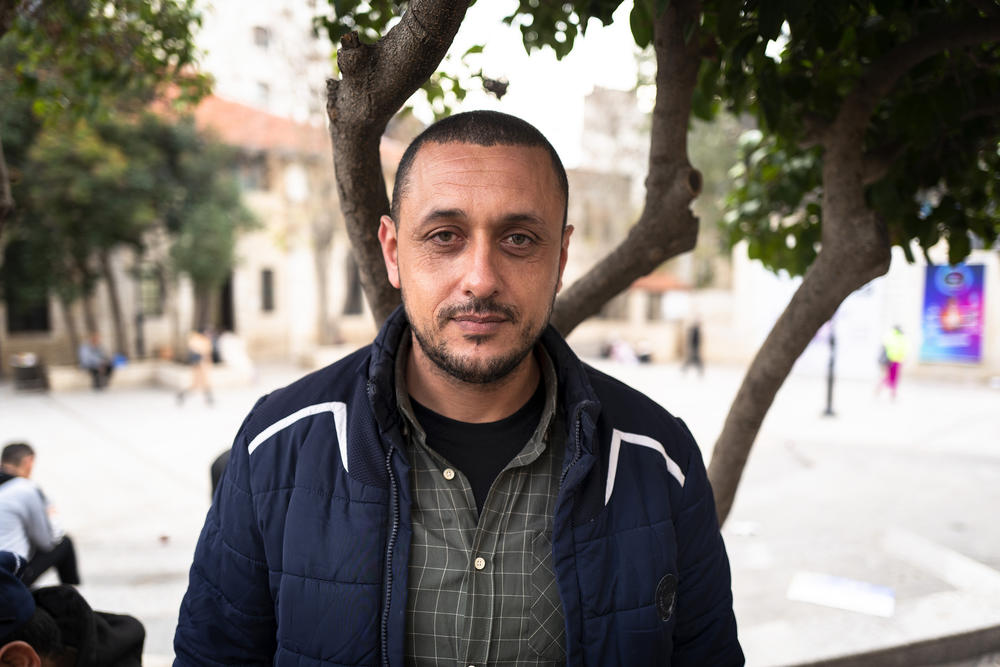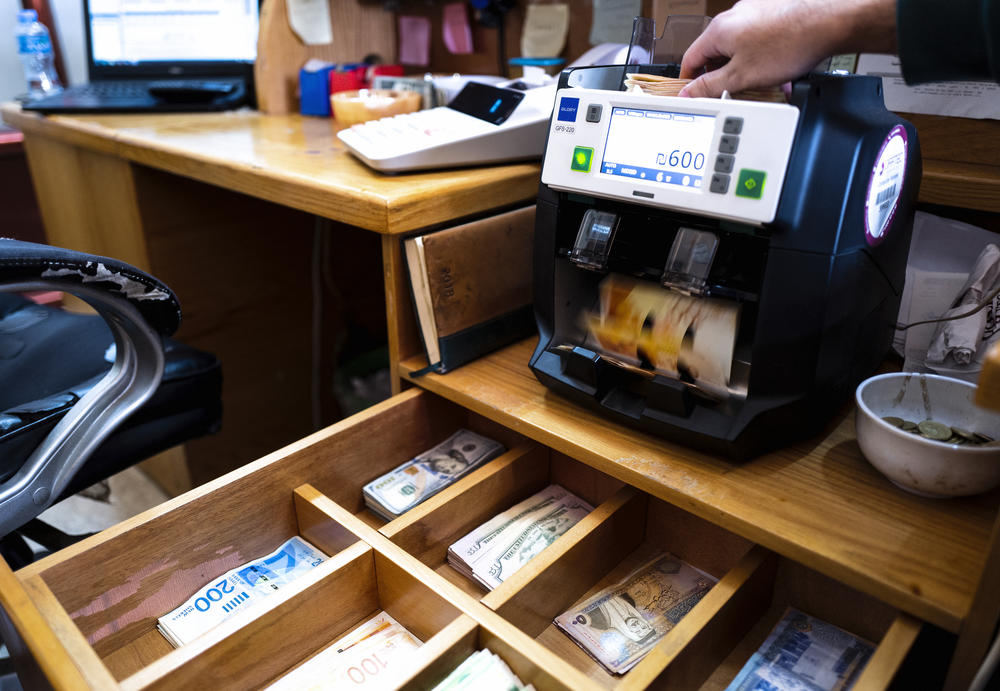Section Branding
Header Content
The West Bank economy has been hammered by war
Primary Content
RAMALLAH, West Bank — Muattaz Qatanani used to commute from Gaza to work each day in Israel, where he built bomb shelters — the kind that Israelis use to seek refuge from Hamas rocket attacks.
"I used to make 450 shekels a day," he says — about $130 at the time. But after Hamas attacked Israel on Oct. 7 and Israel began its assault on Gaza, Qatanani fled to the Israeli-occupied West Bank. He says he hasn't been able to find decent-paying work since.
"Maybe I get a job once a week to wash stairs, to wash windows — that's how I survive," says Qatanani, 41, who has a family back in Gaza. Now he makes about $40 a day — when he can find work.
More than three months into Israel's war in Gaza, the economy of the West Bank is reeling. Many fear the economic pain could lead to even more violence in the territory, which is a bit smaller than Delaware and home to some 3 million Palestinians.
After the Oct. 7 Hamas attack, which Israel says killed about 1,200 people, Israel banned some 100,000 Palestinian laborers in the West Bank from crossing the border to work in Israel. The country cited security concerns.
This has been a huge financial blow to the West Bank. Wages of cross-border workers account for $5.5 billion a year, about one-third of the combined economy of the West Bank and Gaza, according to the World Bank.
In addition, Israel and the Palestinian Authority are in a dispute over tax money that Israel collects for the West Bank and Gaza. As a result, the Palestinian Authority, which oversees parts of the West Bank, has had to cut the wages of its 143,000 workers. They received no pay in October, half-pay in November and close to 80% in December, says Manal Farhan, the Palestinian Authority's deputy minister for the national economy.
"This time, it's the worst," says Farhan, "the worst hit for our economy since the establishment of the Palestinian Authority."
The Palestinian Authority was established in 1994.
Stroll through the streets of Ramallah these days, and the war's economic impact seems to be everywhere. Baha Tamimi, who runs a gold shop in the heart of the city, says 4 out of 5 people who visit now don't want to buy gold — they want to sell it.
"A woman took off her wedding ring to help her husband pay the bills and buy vegetables — this happened right in front of me," Tamimi recalls, as video of people pulling bodies from the rubble in Gaza plays on the shop's TV.
More than 25,000 Palestinians have been killed since Israel invaded Gaza, according to the territory's health ministry.
Nearby, Joudeh Said is cutting a piece of wood in his carpentry shop. He says he has one or two jobs these days, but no one has much money to pay.
"They give me a check, and then the check bounces, and then I have to chase them," he says.
Since the war began, Said says, customers owe him $32,000, which is a lot of money in the West Bank. Per capita gross domestic product in the territory is just $4,500 a year, according to the World Bank. Across the border in Israel, it is nearly $55,000.
In addition to the economic impact that the war in Gaza is having, Israeli soldiers are killing more and more Palestinians in the West Bank. The United Nations says the Israeli military has killed about 350 people in the West Bank since Oct. 7. The Israelis say they are rooting out militants.
Samir Anati, who co-owns the carpentry shop, says if the economy continues to slide, violence will only grow.
"For sure," he says. "I have children to feed. What can I do? I work now and get them food. I may not be able to tomorrow."
"So it is not me who will go for an intifada," or uprising, Anati continues. "My children will."
Samir Hulileh, a leading economist and businessman, worries about the impact on public workers if they are not paid. He's especially concerned about the Palestinian Authority maintaining the loyalty of its security forces, who are supposed to maintain law and order in the areas that the Palestinian Authority oversees.
"You are telling people who have their Kalashnikovs with them, 'I will not spend money on you,'" warns Hulileh, who adds that other groups, including Hamas, could recruit them. "You are opening up your security forces in the West Bank for options."
Khalil Shikaki, an academic and pollster who runs the Palestinian Center for Policy and Survey Research in Ramallah, is not as concerned about the security forces. But he does worry that the West Bank's battered economy is just one more ingredient in an already combustible brew.
Shikaki notes that since the start of the war, Hamas' popularity in the West Bank has more than tripled — from 12% to 42%, according to his polls. In addition, some Israeli settlers in the West Bank continue to attack Palestinians, and an increasing number of Palestinians feel they have no diplomatic alternative to violence.
"The West Bank is currently boiling," says Shikaki, "just waiting for the spark that could eventually lead to a major explosion."
Nuha Musleh contributed reporting in Ramallah, West Bank.
Copyright 2024 NPR. To see more, visit https://www.npr.org.





